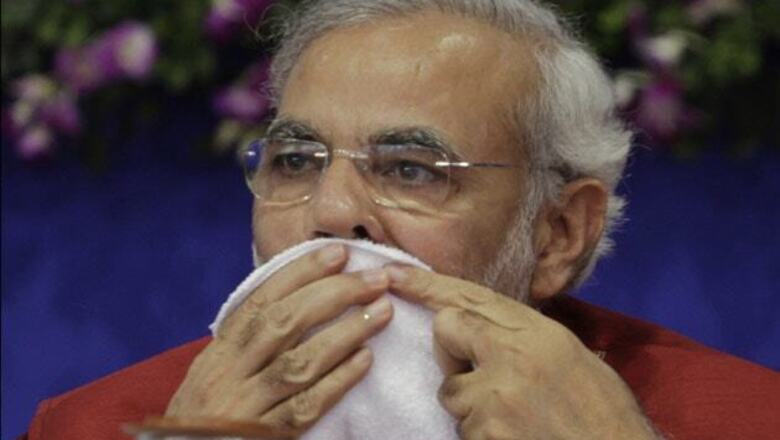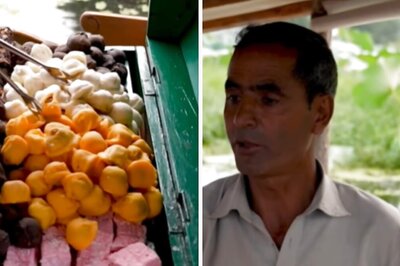
views
Ahmedabad: An Ahmedabad court will pass its order on the Special Investigation Team (SIT) report on the Gulbarg Society massacre during the 2002 Gujarat riots on February 15. The SIT on Monday opposed giving its report on the massacre to Teesta Setalvad-led Citizens for Justice and Peace and senior lawyer Mukul Sinha, saying that they had "no locus in the case".
The SIT opposed not only the duo in the court of Metropolitan Magistrate MS Bhat in Ahmedabad, which is hearing the closure report on the Gulbarg Society massacre, but also said that Zakia Jafri, widow of slain Congress MP Ehsaan Jafri, could not be given the report as she was not a complainant.
SIT counsel SC Jamuvar said that certified copies could be made available only after the Investigation officer made a statement on oath that the report had been submitted.
"Teesta was not the original complainant, she joined later. The Supreme Court order says give report only to complainant, not complainants. Zakia is not a complainant at this stage, hence she cannot be given copy of the report," said Jamuvar.
"We have not brought all the annexures and evidence before the court as we felt there would not be enough space and security to keep the documents," he said.
Teesta's lawyer SM Vora countered the SIT citing a Supreme Court, which said that that before taking a final decision, parties must have access to the report. Citizen for Justice and Peace lawyer IM Munshi demanded that the report be given to the complainants
"What needs to be considered at this stage is all the documents and evidence have to be submitted to court, and this has to be given to complainants. If the SIT has not submitted all the documents so far, it clearly is contempt of the Suprem Court order," said Munshi.
He argued before the court that the SIT had deliberately delayed the report and not filing all documents was also a deliberate act.
Another NGO Jansangharsh Manch's lawyer Shamshad Pathan said that everybody was entitled to get the SIT report.
"The report is a public document under definition of Evidence Act. Anybody, not only petitioner can get certified copies of the report," said Pathan.
Sources have told CNN-IBN that the SIT has reportedly said there is no prosecutable evidence against Gujarat Chief Minister Narendra Modi among others in its over 1,000-page report with an additional trunk of material evidence. The SIT concluded its probe after examining 1,700 statements recorded by it.
In April 2011, the SIT team headed by former Central Bureau of Investigation (CBI) chief RK Raghavan had submitted its report in a sealed envelope to the Supreme Court.
Zakia Jafri had approached the Supreme Court in 2008 seeking a probe against the Gujarat Chief Minister. In September 2011, the apex court refused to pass an order on Modi and directed the concerned Magistrate of Ahmedabad to decide on the case.
Social activists allege that Modi allowed the dead bodies of karsewaks killed in the Sabarmati Express train in Godhra to be brought to Ahmedabad. But according to sources the SIT says Modi's decision was justified as Godhra was more sensitive than Ahmedabad and that the hospitals in Godhra were not equipped for conducting the DNA test.
There were also charges that Narendra Modi called the Army too late. The SIT report has used the fax sent by the Gujarat government to the Defence Ministry as its evidence.
Another allegation against Modi is that he knew about the threat to life of Ehsan Jafri but didn't take any action. However, the SIT didn't find any evidence of any call made by Jafri to the Chief Minister or the Ahmedabad Police Commissioner when the Gulbarg society was attacked. The SIT said that they went through several call records but couldn't find any confirmation of the allegation that Jafri sought protection from Modi.
The amicus curiae Raju Ramachandran appointed by the Supreme Court to look into the lapses of the SIT has agreed with it on the most of the findings and has concluded that there is no evidence against the Gujarat Chief Minister to prosecute him.
Sources have told CNN-IBN that on several issues the amicus curiae has also differed with the SIT.
While the allegation against Modi is that during the meeting held at the Chief Ministrer's house, he had stated that the Muslims should be taught a lesson, the SIT says no such instruction was given by him. Regarding the presence of IPS officer Sanjiv Bhatt, it says he wasn't present in the meeting. The amicus curiae has a different view regarding the meeting.
But the SIT report does throw up several embarrassing questions for Narendra Modi.
It says that despite ghastly violent attacks on Muslims in Gulbarg society and Naroda Patiya, the reaction of the government was not the type which would have been expected of anyone. The Chief Minister tried to water down the seriousness of the situation at Gulbarg society and Naroda Patiya by saying every action has an equal and opposite reaction. The report also criticises Modi for appointing pro-VHP advocates as public prosecutors in the riot cases.
Modi did not visit riot affected areas though he was at Godhra on February 27, 2002 and most damagingly for Modi, it says, the government destroyed wireless records of police conversation on February 27, 2002.



















Comments
0 comment